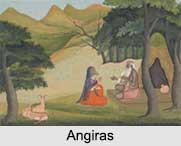 Angiras is an author of many Vedic hymns. The hymns of the Atharva Veda are called "Angirasas". His name is also mentioned in a subsequent period as one of the inspired legislators of India and as the author of an astronomical work. Angiras is also considered as one of the seven Rishis who preside over the reign of the first Manusmriti or Swayambhuva. He is one of the originators of the gotra system. He is also known as one of the ten Manasputras – the wish-born sons of Lord Brahma.
Angiras is an author of many Vedic hymns. The hymns of the Atharva Veda are called "Angirasas". His name is also mentioned in a subsequent period as one of the inspired legislators of India and as the author of an astronomical work. Angiras is also considered as one of the seven Rishis who preside over the reign of the first Manusmriti or Swayambhuva. He is one of the originators of the gotra system. He is also known as one of the ten Manasputras – the wish-born sons of Lord Brahma.
Legends of Angiras
There are various legends related to the name "Angiras". According one of such legends, it is said that the word "Angiras" is derived from the word "Agni" meaning fire. Sometimes, Angiras is referred as an epithet or as the father of Agni. Angiras himself connected with hymns addressed to Agni. According to Shatapatha Brahmana, the Angirasas and the Adityas are said to have descended from Prajapati and that they strove together for the priority in ascending to heaven. He is said to be the religious preceptor of the natives of different planets.
Apart from this, he is also called the "Priest of the Gods", the "Lord of the Sacrifice", etc. He is also considered as a son of Uru by Agneyi, the daughter of Lord Agni. The Richas (or Vaidic hymns), Sasvati, Sinivali, Kuhu, Raka, Anumati are the daughters of Angiras and his sons are Samvarta, Havishmats, Utathaya, Brihaspati and Markandeya. His wives are Swadha, Smriti, Sati, daughters of Daksha and Sraddha, daughter of the Sage Kardama.
Works of Angiras
Angiras was connected with the authorship of a great portion of the sacred Hindu literature. He along with Rishi Atharvan had written most of the Atharva Veda. He also contributed in the other three Vedas. The Atharvan also reports him as a teacher of the Bramhavidya or the sacred knowledge that had been imparted to him by Satyavaha, a descendant of Bharadvaja. Again, as per astronomical personification, he is Brihaspati himself or the regent of the planet Jupiter and presides over the 6th year of the cycle of 60 years.









